2015七年级下册英语Unit5topic1课本知识点归纳讲解及练习题
仁爱版七年级下册英语unit5 topic 1知识点复习

也 新 你” 你通subway.Unit 5 Our School LifeTopic 1 I usually come to school bysubway一、中英互译:1.______________去上学9.______________在平日,在工作日2.watch TV_____________10._____________在学校;在上课3.play soccer_____________11.see a movie_____________4.____________ 一会儿12._____________去睡觉5._____________去游泳13._____________步行6._____________听歌14._____________快点儿,加油7._____________长城15._____________对.....一样8._____________在空闲时间16._____________骑自行车17.__________________________早起的鸟儿有虫吃。
二、重点句型1.-- Happy New Year! 年快乐!---The same to you.也一样。
(新年快乐!)The same to you.意为:“也同样祝你..... 用于公共节假日等别人向你祝福问候时的回答。
相当于:You ,too.练习:--Merry Christmas! ---_____________--Happy birthday! --- _____________2.--How do you usually come to school?常怎样来上学的?--I usually come to school by 我通常乘地铁来上学。
(1)此句中 how 意为:“怎样,”用来询问交通方式。
(2)by subway意为:“乘坐地铁”。
by+交通工具的单数名词是一种常用的表示乘坐某种交通工具的介词短语。
仁爱七年级下册 unit 5 必考知识点
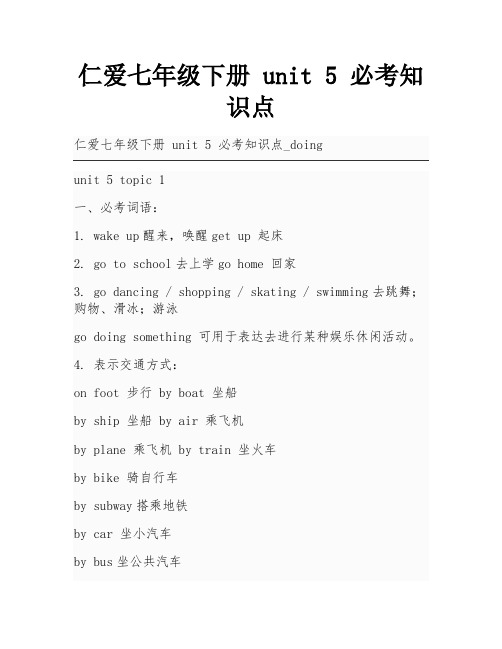
仁爱七年级下册 unit 5 必考知识点unit 5 topic 1一、必考词语:1. wake up醒来,唤醒get up 起床2. go to school去上学go home 回家3. go dancing / shopping / skating / swimming去跳舞;购物、滑冰;游泳go doing something 可用于表达去进行某种娱乐休闲活动。
4. 表示交通方式:on foot 步行 by boat 坐船by ship 坐船 by air 乘飞机by plane 乘飞机 by train 坐火车by bike 骑自行车by subway搭乘地铁by car 坐小汽车by bus坐公共汽车5. take the subway / bus / car搭乘地铁;公共汽车;小汽车6. drive a car to work = go to work by car驾车去上班take a bus to work = go to work by bus 乘公共汽车去上班go to school on foot = walk to school步行去上学7. ride a bike / horse骑自行车;骑马8. after school / class放学以后;下课以后9. play the piano / guitar/ violin弹钢琴;吉他;小提琴play basketball / soccer / football 打篮球;踢足球;打橄榄球play puter games玩电脑游戏play with a puter 玩电脑 play sports 做运动10. next to紧挨着,在…旁边11. on weekdays在工作日 at weekends在周末12. have breakfast / lunch / supper / dinner / meals 吃早餐;中餐;晚餐;正餐;一日三餐have classes / lessons / a meeting上课;上课;开会13. watch tv / movies / games / the animals看电视;电影;比赛;动物read novels / newspapers / books看小说;报纸;书14. wash one’s face / clothes洗脸;衣服15. 反义词:up – down, early – late近义词:quickly– fastget up early 早起 be late for 迟到16 表示建筑物(尤其学校建筑物):on the playground在操场 at school / home / table学校;家里;桌旁in a puter room / teachers’ office / classroombuilding / gym / library / lab / canteen在电脑室;教师办公室;教学楼;体操馆;图书馆;实验室;食堂17. around six o’clock = at about six o’clock大约在六点18. 频率副词:never, seldom, sometimes, often, usually, always重点详解1.i always e to school by bus.by+交通工具名称,表示使用某种交通方式,中间不加限定词,如果交通工具前有a, the, my 等限定词,就不能用by,而是用in或是on.on the train=by train on his bike=by bike in my car=by car.巧辩异同on foot 与 walkon foot “走路”,是介词短语,不能作谓语,只作方式状语,位于句末。
仁爱英语七年级Unit5Topic1重点归纳

Unit5 Topic1重点归纳1.by+交通工具单数名词,中间不加限定词,表示乘坐某种交通工具,在句子中作方式状语,放于句末。
2.表示乘坐某种交通工具,有以下四种表达:(1)by+交通工具;(2)take a/the+交通工具;(3)in/on+a/the+交通工具;(4)walk/ride/drive/fly to+地点名词3. go to school by bus/on a bus =take a bus to school坐公共汽车去学校4. go to school on foot=walk to school步行去学校5. go to the zoo by car/in one’s car=drive to the zoo开车去动物园6. go to Beijing by plane=fly to Beijing坐飞机去北京7. 频度副词always, usually, often, sometimes, seldom, never置于行为动词前,be动词、情态动词和助动词之后。
8. It’s time for (doing) sth.=It’s time to do sth. 该做某事的时间了9. 对方式提问用How(怎样);对频率提问用How often(多久一次);对具体的时间提问用What time(什么时候/几点钟),常用at+“具体时间”回答。
10.do one’s homework 做家庭作业11.for a short time一会儿12.know about/of sth. 了解……的情况13.be over结束14.in one’s free/spare time 在某人的空闲/业余时间15. 辨析:watch/look/seewatch强调聚精会神地看,常指看动态的食物;look强调看的动作,后接宾语时加at再加宾语;see 强调看的结果,表示看见某物。
e on加油17.on weekdays在工作日18.watch TV看电视19.would like/want to do sth.想做某事。
七年级英语(仁爱版)下册 Unit-5-Topic-1 知识点总结语言点归纳

知识点七年级英语(仁爱版)下册Unit-5-Topic-1语言点归纳Unit 5 Topic 1I 重点词汇和短语gate, by, always, plane, train, ship, boat, Ms., grandmother, group, weekday, early, bird, catch, seldom, walk, never, sometimes, ride, park, watch, TV, homework, life, American, or, few, day, rest, play, basketball, swim, ball, game, read, listen, library, once, twice, week, every, must, first, music, begin, while, wall, bed.the same to, come on, on foot, by plane, know about, for a while, watch TV, do (one’s) homework, have lunch, at school, have a rest, be different from, go swimming, listen to, go to bed, go to school, have classes.II 语言点Section A1. a) ---Happy New Year! ---- The same to you! / You, too. 新年快乐!也祝你新年快乐!b) ----Happy birthday! -----Thank you! 生日快乐!谢谢!2. How about you? = What about you? 你怎么样?3. Oh, your new bike looks very nice! 哦,你的新自行车看起来很好看。
七年级英语下U5知识点
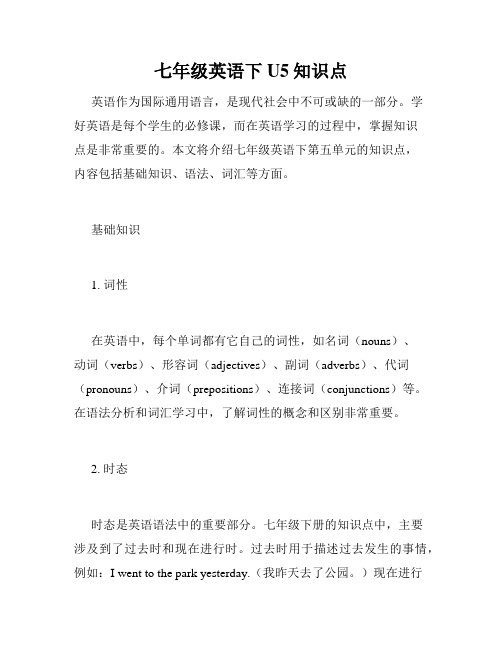
七年级英语下U5知识点英语作为国际通用语言,是现代社会中不可或缺的一部分。
学好英语是每个学生的必修课,而在英语学习的过程中,掌握知识点是非常重要的。
本文将介绍七年级英语下第五单元的知识点,内容包括基础知识、语法、词汇等方面。
基础知识1. 词性在英语中,每个单词都有它自己的词性,如名词(nouns)、动词(verbs)、形容词(adjectives)、副词(adverbs)、代词(pronouns)、介词(prepositions)、连接词(conjunctions)等。
在语法分析和词汇学习中,了解词性的概念和区别非常重要。
2. 时态时态是英语语法中的重要部分。
七年级下册的知识点中,主要涉及到了过去时和现在进行时。
过去时用于描述过去发生的事情,例如:I went to the park yesterday.(我昨天去了公园。
)现在进行时则用于描述现在正在发生的事情,例如:I am studying English now.(我现在正在学英语。
)掌握不同的时态,可以更好地理解和表达英语的意思。
语法1.陈述句和疑问句陈述句和疑问句是英语语法中的两种基本句型。
陈述句用于陈述某种事实,例如:I have a dog.(我有一只狗。
)疑问句则是用于问问题,例如:Do you have a dog?(你有一只狗吗?)在句型结构和词语选择上,两者有所不同。
2.情态动词情态动词是英语语法中的一类特殊动词,包括 can、could、may、might、must、shall、should、will、would 等。
它们具有独特的语意功能,在表达能力、推测、义务、建议等方面起到了重要的作用。
例如:You should study harder.(你应该更加努力学习。
)在语法分析和语言表达中,掌握情态动词的用法非常重要。
词汇1. 日常用语在英语的生活交流中,常用的日常用语涉及到问候、感谢、道歉、请求等方面。
例如:Hello.(你好。
七下unit5 topic1主要知识点

1. the same to you = you too 也祝福你……(用于公共节日,假日等别人向你祝福时回应对方)2.look(1)v.+ n /名词性词组看Look at the blackboard.(2)系动词+形容词看起来……She looks very nice.3. --How do you usually go to school? (how询问别人的交通方式)--I usually go to school by bike.by+交通工具构成介词短语=in/on /take + a/an/the/one’s + 交通工具注意:on foot 步行 on horseback 骑马4.It’s time for sth/doing sth. 是做某事的时候了=It’s time to do sth.It’s time for breakfast. = It’s time to have breakfast = It’s time for having breakfast.It’s time for sb. to do sth. 到某人该做某事的时候了It’s time for me to have lunch.5.频率副词:never 决不, seldom 很少, sometimes有时候, often 常常, usually 通常, always 总是。
频率度:never < seldom < sometimes < often < usually < always(1)频度副词在句中的位置:①行为动词之前 I often walk to school.②系动词、助动词或情态动词之后 Mary is always late for school.③为了突出和强调,置于句首 Sometimes he goes to school on foot.(2)对于频度副词的提问--Jim always goes home by bike.--How often does Jim go home?6.表数量的不定代词(1) few 几乎没有,极少(表否定)(2) a few 少数几个,一些(表肯定)代替或修饰可数名词,在句中作主语、宾语、定语She is new here, so she has few friends here. (几乎没有)She is new here, but she has a few friends here.(有几个)(3) little 不多,几乎没有(表否定)(4) a little 虽少,但是还有一些,一点儿代替或修饰不可数名词,在句中作主语、宾语、定语Hurry up, there is little time left.(没有时间)There is a little water in the cup. (一些水)7.have + a + 名词have a look 看一看 have a swim 游泳 have a meeting 开会Do they have a short break after lunch.8.in one’s free/spara time 在某人闲暇时9.play + 球类名词 play football/basketballplay + the + 乐器 play the guitargo + doing 表示去做某事 go fishing/shopping/swimming/skating10.一般现在时:表经常反复的动作,存在的状态或习惯性动作。
仁爱版本初中七年级的下册的Unit5Topic1学习知识点学习归纳.doc

Unit 5 Our School LifeTopic 1 How do you usually come to school?一、语法:频度副词二、重点句型:1.I never come to school by subway.2.Maria sometimes takes the subway home.3. We usually go to the park on foot.4.I seldom walk to school.5.Li Xiang often rides a bike to school.6. They always go to the zoo by bus.7. --Happy New Year! --Happy New Year!/ The same to you.8.The early bird catches the worm.9.She goes to bed at about a quarter to ten.10. --How often do you come to the library?--Three times a week./ Very often./ Every day.三、单词: gate, by, subway, always, come on, on foot, plane, train, ship, boat, weekday, early, bird, catch,worm, sometimes,seldom, walk, never, ride, park, watch, TV, watch TV, soccer, movie, begin, at school, after, bed, basketball, swim, listen, music, library, week, once, twice, great, wall, the Great Wall,life, American, or, over, more, talk四、重点知识点1. The same to you也祝你,,。
七年级英语(仁爱版)下册Unit_5_Topic_1知识点练习
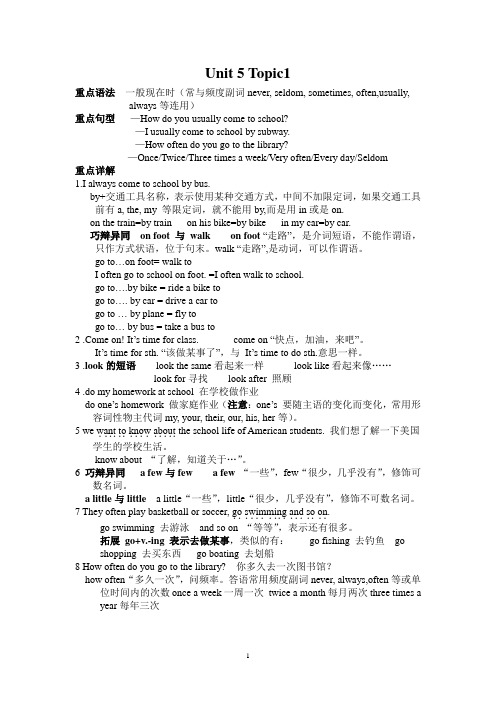
Unit 5 Topic1重点语法一般现在时(常与频度副词never, seldom, sometimes, often,usually, always等连用)重点句型—How do you usually come to school?—I usually come to school by subway.—How often do you go to the library?—Once/Twice/Three times a week/Very often/Every day/Seldom重点详解1.I always come to school by bus.by+交通工具名称,表示使用某种交通方式,中间不加限定词,如果交通工具前有a, the, my 等限定词,就不能用by,而是用in或是on.on the train=by train on his bike=by bike in my car=by car.巧辩异同on foot 与walk on foot “走路”,是介词短语,不能作谓语,只作方式状语,位于句末。
walk “走路”,是动词,可以作谓语。
go to…on foot= walk toI often go to school on foot. =I often walk to school.go to….by bike = ride a bike togo to…. by car = drive a car togo to … by plane = fly togo to… by bus = take a bus to2 .Come on! It’s time for class. come on “快点,加油,来吧”。
It’s time for sth. “该做某事了”,与It’s time to do sth.意思一样。
3 .look的短语look the same看起来一样look like看起来像……look for寻找look after 照顾4 .do my homework at school 在学校做作业do one’s homework 做家庭作业(注意:one’s 要随主语的变化而变化,常用形容词性物主代词my, your, their, our, his, her等)。
仁爱版七年级英语下册unit5-topic1重要知识点总结和语法点归纳
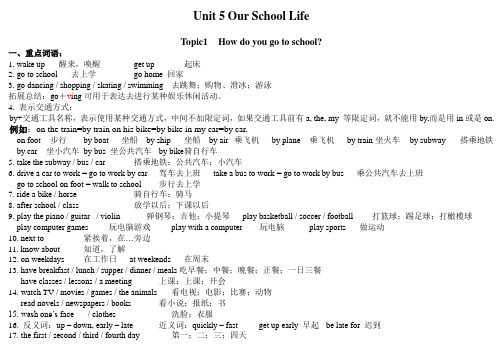
Unit 5 Our School LifeTopic1 How do you go to school?一、重点词语:1. wake up 醒来,唤醒get up 起床2. go to school 去上学go home 回家3. go dancing / shopping / skating / swimming 去跳舞;购物、滑冰;游泳拓展总结:go+v ing可用于表达去进行某种娱乐休闲活动。
4. 表示交通方式:by+交通工具名称,表示使用某种交通方式,中间不加限定词,如果交通工具前有a, the, my 等限定词,就不能用by,而是用in或是on. 例如:on the train=by train on his bike=by bike in my car=by car.on foot 步行by boat 坐船by ship 坐船by air 乘飞机by plane 乘飞机by train坐火车by subway 搭乘地铁by car 坐小汽车by bus 坐公共汽车by bike 骑自行车5. take the subway / bus / car 搭乘地铁;公共汽车;小汽车6. drive a car to work = go to work by car 驾车去上班take a bus to work = go to work by bus 乘公共汽车去上班go to school on foot = walk to school 步行去上学7. ride a bike / horse 骑自行车;骑马8. after school / class 放学以后;下课以后9. play the piano / guitar / violin 弹钢琴;吉他;小提琴play basketball / soccer / football 打篮球;踢足球;打橄榄球play computer games 玩电脑游戏play with a computer 玩电脑play sports 做运动10. next to 紧挨着,在…旁边11. know about 知道,了解12. on weekdays 在工作日at weekends 在周末13. have breakfast / lunch / supper / dinner / meals吃早餐;中餐;晚餐;正餐;一日三餐have classes / lessons / a meeting 上课;上课;开会14. watch TV / movies / games / the animals 看电视;电影;比赛;动物read novels / newspapers / books 看小说;报纸;书15. wash one’s f ace / clothes 洗脸;衣服16. 反义词:up – down, early – late 近义词:quickly – fast get up early 早起be late for 迟到17. the first / second / third / fourth day 第一;二;三;四天18. clean the house 打扫房子19. 表示建筑物(尤其学校建筑物):on the playground 在操场at school / home / table 在学校;家里;桌旁in a computer room / teachers’ office / classroom building / gym / library / lab / canteen在电脑室;教师办公室;教学楼;体操馆;图书馆;实验室;食堂20. around six o’clock = at about six o’clock大约在六点21. 频率副词:never, seldom, sometimes, often, usually, always22. do my homework at school 在学校做作业do one’s homework 做家庭作业(注意:one’s 要随主语的变化而变化,常用形容词性物主代词my, your, their, our, his, her 等)。
仁爱版七年级下册英语Unit 5 Topic 1知识点总结
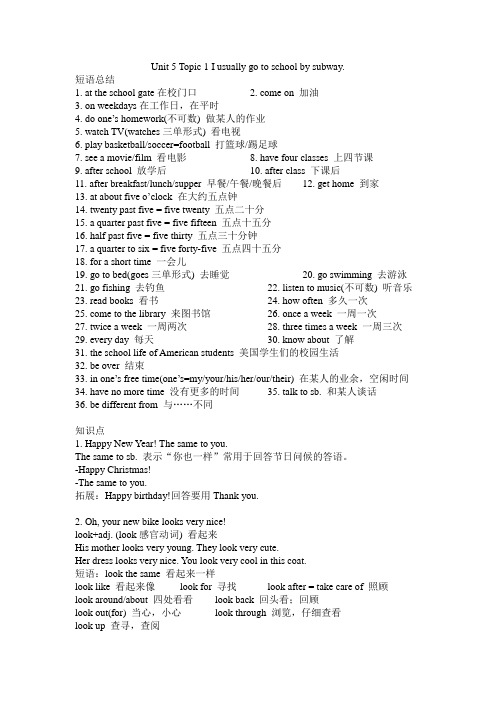
Unit 5 Topic 1 I usually go to school by subway.短语总结1. at the school gate在校门口2. come on 加油3. on weekdays在工作日,在平时4. do one’s homework(不可数) 做某人的作业5. watch TV(watches三单形式) 看电视6. play basketball/soccer=football 打篮球/踢足球7. see a movie/film 看电影8. have four classes 上四节课9. after school 放学后10. after class 下课后11. after breakfast/lunch/supper 早餐/午餐/晚餐后12. get home 到家13. at about five o’clock 在大约五点钟14. twenty past five = five twenty 五点二十分15. a quarter past five = five fifteen 五点十五分16. half past five = five thirty 五点三十分钟17. a quarter to six = five forty-five 五点四十五分18. for a short time 一会儿19. go to bed(goes三单形式) 去睡觉20. go swimming 去游泳21. go fishing 去钓鱼22. listen to music(不可数) 听音乐23. read books 看书24. how often 多久一次25. come to the library 来图书馆26. once a week 一周一次27. twice a week 一周两次28. three times a week 一周三次29. every day 每天30. know about 了解31. the school life of American students 美国学生们的校园生活32. be over 结束33. in one’s free time(one’s=my/your/his/her/our/their) 在某人的业余,空闲时间34. have no more time 没有更多的时间35. talk to sb. 和某人谈话36. be different from 与……不同知识点1. Happy New Year! The same to you.The same to sb. 表示“你也一样”常用于回答节日问候的答语。
仁爱版英语七年级下册知识点归纳(完整版)

仁爱版英语七年级下册知识点归纳(完整版)-CAL-FENGHAI-(2020YEAR-YICAI)_JINGBIAN仁爱版英语七年级下册知识点归纳?英语七年级下册知识点归纳Unit?5?Topic1?重点语法一般现在时(常与频度副词never,?seldom,?sometimes,?often ,usually,?always等连用)重点句型?—How?do?you?usually?come?to?school???—I?usually?come?to?school?by?subway.????????????—How?often?do?you?go?to?the?library????—Once/Twice/Three?times?a?week/Very?often/Every?day/Seldom重点详解1I?always?come?to?school?by?bus.???by+交通工具名称,表示使用某种交通方式,中间不加限定词,如果交通工具前有a,?the,?my?等限定词,就不能用by,而是用in或是on.???on?the?train=by?train???on?his?bike=by?bike???in?my?car=by?car.???巧辩异同on?foot?与?walk????on?foot?“走路”,是介词短语,不能作谓语,只作方式状语,位于句末。
??walk?“走路”,是动词,可以作谓语。
? ? ??go?to…on?foot=?walk?to? ? ???I?often?go?to?school?on?foot.?=I?often?walk?to?school.?????同样,go?to….by?bike?=?ride?a?bike?to?????? ? ? ? ? go?to….?by?car?=?drive?a?car?to????????? ??go?to?…?by?plane?=?fly?to????????? ? ? ? ? go?to…?by?bus?=?take?a?bus?to2???Come?on!?It’s?time?for?class.???????come?on?“快点,加油,来吧”。
2015七年级下册英语Unit5topic1课本知识点归纳讲解及练习题
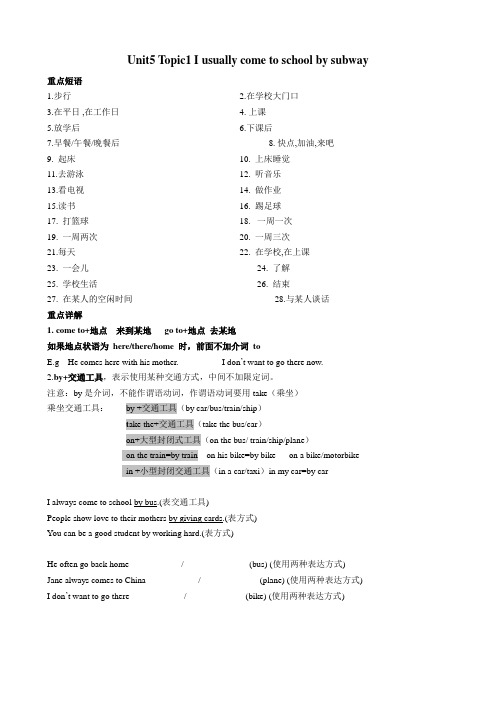
Unit5 Topic1 I usually come to school by subway重点短语1.步行__________________________2.在学校大门口___________________________3.在平日 ,在工作日______________________4. 上课___________________________5.放学后_________________________6.下课后 ___________________________7.早餐/午餐/晚餐后________________________________ 8. 快点,加油,来吧 ____________________9. 起床 ______________________ 10. 上床睡觉_______________________11.去游泳_________________________ 12. 听音乐___________________________13.看电视_________________________ 14. 做作业______________________________15.读书____________________________ 16. 踢足球_____________________________17. 打篮球____________________________ 18. 一周一次_____________________________19. 一周两次____________________________ 20. 一周三次______________________________21.每天___________________________ 22. 在学校,在上课____________________________ 23. 一会儿_______________________________ 24. 了解_______________________________ 25. 学校生活_______________________________ 26. 结束_________________________27. 在某人的空闲时间_______________________________ 28.与某人谈话__________________________ 重点详解1. come to+地点来到某地go to+地点去某地如果地点状语为here/there/home 时,前面不加介词toE.g He comes here with his mother. I don’t want to go there now.2.by+交通工具,表示使用某种交通方式,中间不加限定词。
湖南省衡南县向阳镇初级中学七年级英语下册 Unit 5 Topic 1 I usually come to school by subway知识点总结
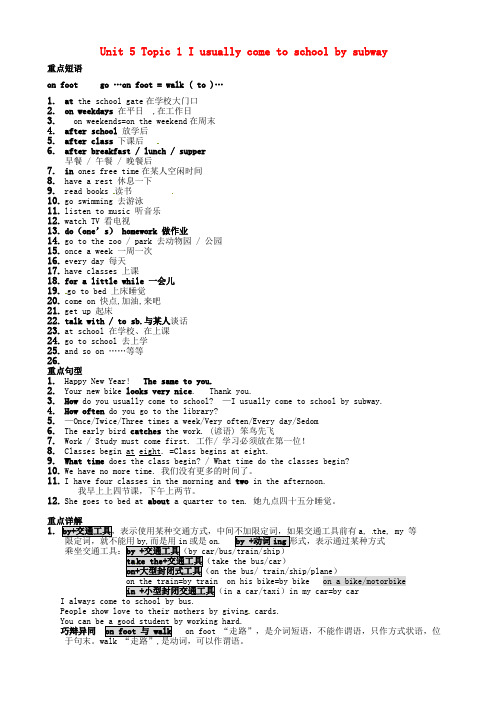
Unit 5 Topic 1 I usually come to school by subway重点短语on foot go …on foot = walk ( to )…1.at the school gate在学校大门口2.on weekdays在平日,在工作日3.on weekends=on the weekend在周末4.after school 放学后5.after class 下课后6.after breakfast / lunch / supper早餐 / 午餐 / 晚餐后7.in ones free time在某人空闲时间8.have a rest 休息一下9.read books 读书10.go swimming 去游泳11.listen to music 听音乐12.watch TV 看电视13.do(one’s) homework 做作业14.go to the zoo / park 去动物园 / 公园15.once a week 一周一次16.every day 每天17.have classes 上课18.for a little while 一会儿19.go to bed 上床睡觉e on 快点,加油,来吧21.get up 起床22.talk with / to sb.与某人谈话23.at school 在学校、在上课24.go to school 去上学25.and so on ……等等26.重点句型1.Happy New Year! The same to you.2.Your new bike looks very nice. Thank you.3.How do you usually come to school? —I usually come to school by subway.4.How often do you go to the library?5.—Once/Twice/Three times a week/Very often/Every day/Sedom6.The early bird catches the work. (谚语) 笨鸟先飞7.Work / Study must come first. 工作/ 学习必须放在第一位!8.Classes begin at eight. =Class begins at eight.9.What time does the class begin? / What time do the classes begin?10.We have no more time. 我们没有更多的时间了。
七年级下册英语Unit5topic1课本知识点归纳讲解及练习题
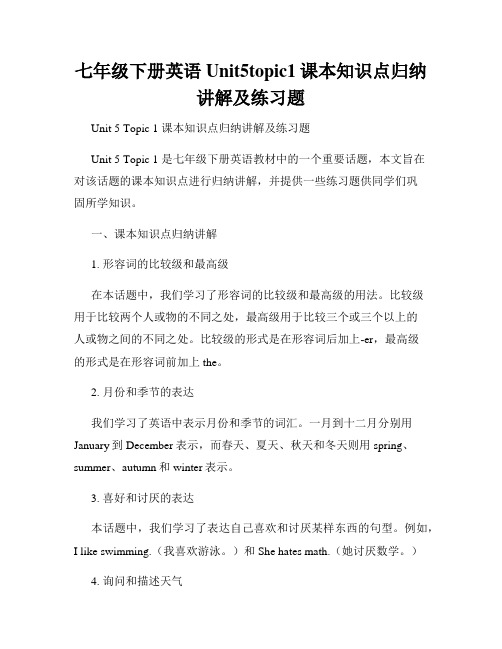
七年级下册英语Unit5topic1课本知识点归纳讲解及练习题Unit 5 Topic 1 课本知识点归纳讲解及练习题Unit 5 Topic 1 是七年级下册英语教材中的一个重要话题,本文旨在对该话题的课本知识点进行归纳讲解,并提供一些练习题供同学们巩固所学知识。
一、课本知识点归纳讲解1. 形容词的比较级和最高级在本话题中,我们学习了形容词的比较级和最高级的用法。
比较级用于比较两个人或物的不同之处,最高级用于比较三个或三个以上的人或物之间的不同之处。
比较级的形式是在形容词后加上-er,最高级的形式是在形容词前加上the。
2. 月份和季节的表达我们学习了英语中表示月份和季节的词汇。
一月到十二月分别用January到December表示,而春天、夏天、秋天和冬天则用spring、summer、autumn和winter表示。
3. 喜好和讨厌的表达本话题中,我们学习了表达自己喜欢和讨厌某样东西的句型。
例如,I like swimming.(我喜欢游泳。
)和She hates math.(她讨厌数学。
)4. 询问和描述天气在本单元,我们学习了询问和描述天气的表达方式。
例如,What's the weather like today?(今天天气怎么样?)和It's sunny and hot.(天晴,很热。
)二、练习题1. 选择最佳答案( )1. --- _______ is your birthday? --- It's in June.A. WhereB. WhenC. What( )2. --- How do you like _______ soccer? --- I love it.A. playB. playingC. plays( )3. --- _______ is your favorite season? --- Autumn.A. WhatB. HowC. When( )4. --- _______ do you hate? --- I hate snakes.A. What other animalsB. What else animalsC. What other animal( )5. What's the _______ like in your city?A. weatherB. foodC. color2. 句型转换1. I am tall. (改为比较级)___________________________________________________________________2. Lily's birthday is in August. (改为一般疑问句)_____________________________________________________________ ______3. They love playing basketball. (改为否定句)_____________________________________________________________ ______4. What's the difference between spring and summer? (改为同义句)_____________________________________________________________ ______5. I hate swimming. (改为同义句)_____________________________________________________________ ______3. 完成句子1. ___ ___ your favorite month?2. How ___ do you ___ soccer?3. I love winter ___ it's very ___.4. What's your ___ ___, Jack?5. My sister ___ ___ swimming.三、答案解析1. 1. B2. B3. A4. C5. A2. 1. I am taller.2. Is Lily's birthday in August?3. They don't love playing basketball.4. What are the similarities and differences between spring and summer?5. I don't like swimming.3. 1. What's2. often, play3. because, cool4. favorite season5. enjoys, (going) swimming.通过对 Unit 5 Topic 1 课本知识点的归纳讲解以及练习题的提供,我们可以巩固我们在这个话题中所学到的知识。
七年级下册unit5topic1的知识点

七年级下册unit5topic1的知识点七年级下册Unit 5 Topic 1的知识点Unit 5 Topic 1是初中英语学习中的一个重要部分,学生需要掌握此部分的相关知识才能够更好地应对英语学习。
以下是本文将要讲解的知识点:1. 物品描述在英语中,描述物品是一个十分基础的能力。
了解和掌握正确的描述方法对于学生之后的学习起到关键性作用。
在此部分中,学生需要学会描述一些日常用品,例如面包、香蕉、雨伞等等。
同时,学生还需要了解物品的分类和特点。
2. 价格在购物过程中,很多时候需要了解物品的价格。
此部分中,学生需要学会询问物品价格的表述方法,例如“How much is this T-shirt?”、“What's the price of this watch?”等等。
同时,学生还需要了解货币单位及常见的电子支付方式。
3. 购物在掌握了上述知识点后,学生就可以开始迈入购物的领域了。
在此部分中,学生需要学会用英语表达购物时所需要使用的语言,例如打折、退货、支付方式等。
此外,学生还需要了解商店和商场的基本布局和分类,例如服装店、鞋店、百货商场等。
4. 日常交流学生在掌握以上知识点之后,可以开始运用英语进行简单的日常交流了。
例如在买菜、买饭的过程中使用英语进行简单的交流,以强化英语口语能力。
总结:以上是七年级下册Unit 5 Topic 1的知识点,学生需要在学习过程中重点掌握,以便在日后的学习和生活中能够灵活运用英语。
同时,学生也可以通过多听、多说、多读、多写的方式巩固知识点,提高英语能力,以取得更好的成绩和更广泛的应用。
七年级英语下册u5t1知识点总结

七年级英语下册u5t1知识点总结Unit 5 Lesson 1是七年级英语下册的一节课,本课时主要介绍了“Can you help me?”这一话题,重点讲解了如何用英语请求帮助的表达方式,同时还介绍了问路和指路的相关词汇和用法。
以下是本节课中需要掌握的知识点:1. Can you help me?这是本节课的重点内容,其主要涉及到几个方面的知识点,如礼貌用语、请求方式、动词的使用等。
在表达请求帮助时,我们应该使用礼貌用语,即“Can you help me?”(你能帮我一下吗?)。
其中,can是一种情态动词,用于表示请求或提供帮助,表示一种客气的方式,我们可以在外出旅游、买东西、找人帮忙等情况下使用。
2. Asking for directions当我们在路上迷路时,要想得到他人的指路帮助,就需要学会用英语进行问路和指路。
问路时应使用What’s the way to...(去...怎么走?)的句型,例如:- What’s the way to the library?(去图书馆怎么走?)在指路时应使用Turn left/right (at ...),go straight (on ...),take the first/second (on ...)等指示性语言,例如:- Turn left at the first corner.(在第一个拐角处向左转。
)- Go straight on for 2 blocks.(直走两个街区。
)3. Vocabulary除了以上两个方面的知识点,本节课还介绍了一些问路和指路时需要用到的词汇,例如:- road(道路)- street(街道)- block(街区)- turn(转弯)- corner(拐角)- cross(穿过)以上这些单词是我们在询问路线和指示方向时需要用到的重要词汇。
总结:以上是七年级英语下册U5T1的知识点总结。
本节课主要涉及了“Can you help me?”这一话题,学生需要掌握礼貌用语、请求方式、动词的使用等方面的知识点。
最新最新(仁爱版)七年级下册Unit 5 topic 1知识全解-word文档

七年级下Unit 5重点全解Unit 5 School LifeTopic 1 I usually come to school by subway.一. 重点词汇:一). 交通工具:bike, ship, boat, bus, taxi, subway, train, plane二). 频率副词:never, seldom, sometimes, often, usually, always三). 常用动词:catch, walk, ride, finish, read, talk ,listen,swim,watch,beg四). 常用形容词:early,great,五). 常用名词:bird,weekday,movie,bed,basketball, week, library. Wall, life.六) . 其他:more, twice, once, American,or,over二、重点短语:1. get up 起床get up early 早起2. go to school 去上学go home 回家3. go dancing / shopping / skating / swimming 去跳舞;购物、滑冰;游泳go doing something 可用于表达去进行某种娱乐休闲活动。
4. 表示交通方式:on foot 步行by boat 坐船by ship 坐船by air 乘飞机by plane 乘飞机by train 坐火车by subway搭乘地铁by car 坐小汽车by bus坐公共汽车by bike 骑自行车5. take the subway / bus / car 搭乘地铁;公共汽车;小汽车go to school on foot = walk to school 步行去上学go home by subway = take the subway home 坐地铁回家go to school by bike = go to school on a bike = ride a bike to school 骑自行车去上学go to the zoo by bus = go to the zoo on a bus = take a bus to the zoo 坐公共汽车去动物园go to the Great Wall by car = go to the Great Wall in a car = drive a car to the Great Wall6. after school / class 放学以后;下课以后7. play basketball / soccer / football 打篮球;踢足球;打橄榄球play computer games 玩电脑游戏play with a computer 玩电脑play sports 做运动8. on weekdays 在工作日at weekends 在周末9. have breakfast / lunch / supper / dinner / meals 吃早餐;中餐;晚餐;正餐;一日三餐have classes / lessons / a meeting 上课;上课;开会10. watch TV / movies / games / the animals 看电视;电影;比赛;动物read novels / newspapers / books 看小说;报纸;书11. around six o’clock = at about six o’clock 大约在六点12. know about 知道关于…13. the school life 学校生活14. take a yellow school bus 乘坐黄色校车15. have a short break = have a short rest 短暂休息16. in their free time = in their spare time 在他们的空闲时间18. listen to music 听音乐19. once / twice / three times a week 一个星期一次/两次/三次20. for a short time 一会儿21. go to bed 上床睡觉二.重要单词的用法1. look (感官动词) 看起来,后面加形容词His mother looks very young.They look very cute.Her dress looks very nice.You look very cool in this coat.2. over (形容词)School / Class is over.3. begin现在分词: beginning 过去式: beganbegin to do sth , begin doing sthHe begins to write a letter. =He begins writing a letter.如果begin本身为分词,只能用begin to do sthHe is beginning to run.4. listen to 听(动作),hear 听见(结果)5. always 反义词never6. 本话题涉及的时态为一般现在时,句中常有频率副词或表示频率的短语,如果主语为三单,动词一定要用三单!三. 重点句型及重点语言点:1. Happy New Year! The same to you! 新年快乐!同喜同乐!注意:Happy birthday! 回答应为Thank you!2. How do you usually come to school? 你通常怎样来学校?How引导的特殊疑问句用来询问去某地的交通方式。
- 1、下载文档前请自行甄别文档内容的完整性,平台不提供额外的编辑、内容补充、找答案等附加服务。
- 2、"仅部分预览"的文档,不可在线预览部分如存在完整性等问题,可反馈申请退款(可完整预览的文档不适用该条件!)。
- 3、如文档侵犯您的权益,请联系客服反馈,我们会尽快为您处理(人工客服工作时间:9:00-18:30)。
Unit5 Our school lifetopic1 How do you ususally come to school重点短语1.on foot go …on foot = walk ( to )…2.at the school gate在学校大门口3.on weekdays 在平日 ,在工作日4. on weekends=on the weekend在周末5.after school 放学后6.after class 下课后7.after breakfast / lunch / supper早餐/ 午餐/ 晚餐后8.in ones free time在某人空闲时间9.have a rest 休息一下10.read books 读书11.go swimming 去游泳12.listen to music 听音乐13.watch TV 看电视14.do(one’s)homework 做作业15.go to the zoo / park 去动物园/ 公园16.once a week 一周一次17.every day 每天18.have classes 上课19.for a little while 一会儿20.go to bed 上床睡觉e on 快点,加油,来吧22.get up 起床23.talk with / to sb.与某人谈话24.at school 在学校、在上课25.go to school 去上重点句型1.Happy New Year! The same to you.2.Your new bike looks very nice. Thank you.3.How do you usually come to school? —I usually come to school by subway.4.How often do you go to the library?5.—Once/Twice/Three times a week/Very often/Every day/Sedom6.The early bird catches the work. (谚语) 笨鸟先飞7.Work / Study must come first. 工作/ 学习必须放在第一位!8.Classes begin at eight. =Class begins at eight.9.What time does the class begin? / What time do the classes begin?10.We have no more time. 我们没有更多的时间了。
11.I have four classes in the morning and two in the afternoon.我早上上四节课,下午上两节。
12.She goes to bed at about a quarter to ten. 她九点四十五分睡觉。
重点详解1. Come to+地点来到某地go to+地点去某地如果地点状语为here/there/home 时,前面不加介词toE.g He comes here with his mother.I don’t want to go there now.2.by+交通工具,表示使用某种交通方式,中间不加限定词,如果交通工具前有a, the, my 等限定词,就不能用by,而是用in或是on. by +动词ing形式,表示通过某种方式乘坐交通工具:by +交通工具(by car/bus/train/ship)t ake the+交通工具(take the bus/car)on+大型封闭式工具(on the bus/ train/ship/plane)on the train=by train on his bike=by bike on a bike/motorbikein +小型封闭交通工具(in a car/taxi)in my car=by carI always come to school by bus.(表交通工具)People show love to their mothers by giving cards.(表方式)You can be a good student by working hard.(表方式)He often go back home____________/_____________ (bus) (使用两种表达方式)Jane always comes to China____________/_____________ (plane) (使用两种表达方式)I don’t want to go there ____________/_____________ (bike) (使用两种表达方式)巧辩异同on foot 与walk on foot “走路”,是介词短语,不能作谓语,只作方式状语,位于句末。
walk “走路”,是动词,可以作谓语。
take the bus = go …by bus ride a bike = go …by biketake the subway = go …by subwaygo to…on foot= walk to I often go to school on foot. =I often walk to school.go to….by bike = ride a bike go to…. by car = drive a car togo to …by plane = fly to go to…by bus = take a bus toI often go home on foot(写出同义句)I often_______ __________.He always takes the bus to school.(写出同义句)He always_____ _____ _______ _______ _______.His father ususally go to work by car.(写出同义句)His father usually ________ ________ __________ __________work.2.It’s time for sth. “该做某事了”=It’s time to do sth.It’s time for class. =It’s time to have class. =It’s time for having class.句子:It’s time for lunce(写出同义句)3.look +adj (look感官动词,系动词) 看起来His mother looks very young. They look very cute.Her dress looks very nice. You look very cool in this coat.注意:Look作为实义动词时候,和作为系动词时候的区别用Look,Look at填空。
!There is an plane in the sky.Please__________________ the blackboard.You________ very nice on this skirt.look的短语look the same看起来一样look like看起来像……look for寻找look after =take care of 照顾,照料look around/abou t 四处看看,四下环顾; look back回头看;回顾;look out当心,小心,留神; look through 浏览,仔细查看;look up查寻,查阅;抬头看4. do one’s homework做家庭作业(注:one’s 要随主语的变化而变化,常用形容词性物主代词my, your, their, our, his, her等)。
do my homework at school 在学校做作业5.want to do sth.“想做某事”,want 后接动词不定式作宾语。
know about“了解,知道关于…”。
we want to know about the school life of American students.我们想了解一下美国学生的学校生活。
He knows a lot about China. 他对于中国非常了解。
用所给词的正确形式填空:He___________________ (want) buy a pair of shoes for his mother.Jimmy__________________(want) one pair of basketball shoes.6. 巧辩异同a few+可数名词(肯定);一点,一些;few+可数名词:(否定)很少,几乎没有a little+不可数名词(肯定);一点,一些;little +不可数名词:(否定)很少,几乎没有little和few作形容词用,都表示“几乎没有”,强调少; a little和a few强调有一些。
E.g. He has a few friends. 他有几个朋友。
He has few friends. 他几乎没有朋友。
E.g. I can speak only a little Chinese. They has little money. 他们没有什麽钱a little 与little也可以用作副词,表示“有点”“稍稍”表示“很少”e.g. Can you speak English? ---Yes, but only a little.This book is a little more difficult than that one. (可修饰形容词比较级)She slept little last night. 昨天晚上,她没有怎么睡觉。
用few,a few ,little,a little填空。
1.He has _________ friends there.2.I usually only eat a _______ at lunch time.3.Very _______ children like getting up a 5 o'clock in the morning.4.He wanted to drink __________ orange juice7. go+v.-ing 表示去做某事,类似:go fishing 去钓鱼go shopping 去买东西go boating 去划船go skating 去滑冰go swimming 去游泳and so on “等等”,表示还有很多。
